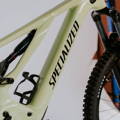Between $2,500 and $3,000 hits the sweet spot for entry- to mid-tier electric mountain bikes. That price range opens up the range of e-MTBs from top brands like Trek, Giant, Specialized, and others with innovative designs and quality parts. Models that fall into that price range are typically hardtail mountain e-bikes or pre-owned full-suspension models.
Spending less than $2,000 means the e-bike will likely come with a rear hub motor, less premium mid-drive unit, or an external battery. Riders can browse the best mountain bikes for under $2,000 designed for recreational riding and lighter mountain biking.
What to Know Before Buying Your First Electric Mountain Bike
Written by: Rémy Rossi | July 25, 2025 | Time to read 5 min
Thinking about buying your first e-MTB? Before you drop thousands, read this guide to find the perfect ride—without blowing your budget.

More about the Author: Remy Rossi
Rémy Rossi is a bike writer, mechanic, and educator who got his start in community-based bike shops and co-ops. With a decade in the industry, he still wrenches on bikes when he can and plays bike polo on a fixie.

What is an electric mountain bike (e-MTB)?

Choose the style of e-MTB

- Cross‑Country (XC) e‑MTB: Lightweight and efficient for fast climbs and smoother trails.
- Trail e‑MTB: Versatile all-rounder for varied terrain and moderate technical descents.
- Enduro e‑MTB: Built for aggressive downhill riding and rugged, technical trails.
- All‑Terrain / Adventure e‑Bike: Budget-friendly option for light off-road use and casual exploration.
- Hardtail e‑MTB: Front suspension only; ideal for beginners and less demanding trails.
- Full-Suspension e‑MTB: Front and rear suspension for tackling rough, technical terrain with control.
🤝 Get an even better discount when you trade in your electric bike now!
Click here for a price estimation
All-terrain e-Bikes vs. electric mountain bikes

Hardtail vs. full-suspension?
🤝 Why you can trust us for buying an e-Bike?
- Great prices: Get your next e-Bike for up to 60% off retail prices, in new or like-new conditions.
- Quality Guaranteed: Every e-Bike is rigorously certified by a team of professional mechanics, and comes with a 1-year warranty.
- Delivered to Your Door: Delivered to your home within a week. Change your mind? Return it thanks to our 14-day return policy.
Wheel size & bike fit

How much should I spend on an electric mountain bike?
Electric mountain bikes are some of the most expensive e-Bikes because of the advanced suspension, premium mid-drive motors, and rugged components. If you’re paying retail, expect to shell out upwards of $4,000 or more on a new model— full-suspension e-MTBs or carbon fiber builds can cost even more, often breaking the $10,000 mark.
Luckily for you, Upway stocks tons of high-quality electric mountain bikes from the top brands like Specialized, Trek, and Cannondale, for sale with savings of up to 60%. Our like-new and pre-owned models offer amazing value on the best electric mountain bikes out there!
Frequently Asked Questions
How much should you spend on an electric mountain bike?
How much should you spend on an electric mountain bike?
Between $2,500 and $3,000 hits the sweet spot for entry- to mid-tier electric mountain bikes. That price range opens up the range of e-MTBs from top brands like Trek, Giant, Specialized, and others with innovative designs and quality parts. Models that fall into that price range are typically hardtail mountain e-bikes or pre-owned full-suspension models.
Spending less than $2,000 means the e-bike will likely come with a rear hub motor, less premium mid-drive unit, or an external battery. Riders can browse the best mountain bikes for under $2,000 designed for recreational riding and lighter mountain biking.
Where can I find trails that allow electric mountain bikes?
Apps such as Trailforks have an e-MTB filter to find routes that allow electric mountain bikes. E-Bike owners can filter the Trailforks map on the website or app to show trails where e-MTBs are permitted.
Key Takeaways
- Know Your Terrain & Style: Choose between cross-country, trail, enduro, or all-terrain based on how and where you ride.
- Hardtail vs. Full-Suspension: Hardtails are great for beginners and smoother trails; full-suspension models offer better control on rough terrain.
- Fit & Features Matter: Wheel size, frame geometry, and motor class affect comfort, performance, and trail access—test rides help a lot.


